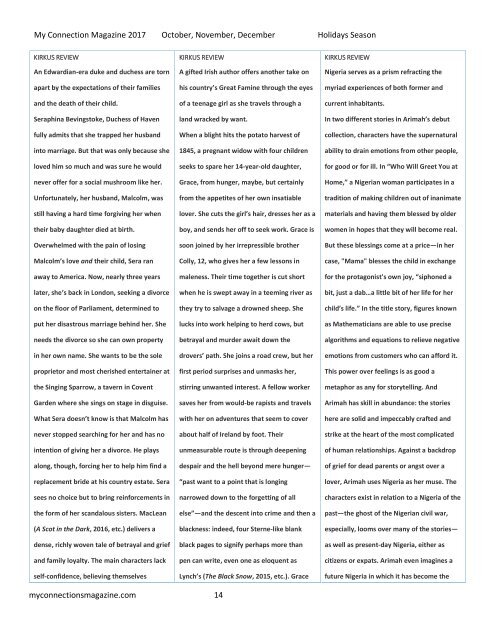My Connections Magazine Holidays Season 2017
My Connections Magazine 2017 Holidays season issue is about a review of 2017, fashion styles for the holidays, New Year's Resolution, health and fitness, and other related topics.
My Connections Magazine 2017 Holidays season issue is about a review of 2017, fashion styles for the holidays, New Year's Resolution, health and fitness, and other related topics.
Create successful ePaper yourself
Turn your PDF publications into a flip-book with our unique Google optimized e-Paper software.
<strong>My</strong> Connection <strong>Magazine</strong> <strong>2017</strong> October, November, December <strong>Holidays</strong> <strong>Season</strong><br />
KIRKUS REVIEW<br />
An Edwardian-era duke and duchess are torn<br />
apart by the expectations of their families<br />
and the death of their child.<br />
Seraphina Bevingstoke, Duchess of Haven<br />
fully admits that she trapped her husband<br />
into marriage. But that was only because she<br />
loved him so much and was sure he would<br />
never offer for a social mushroom like her.<br />
Unfortunately, her husband, Malcolm, was<br />
still having a hard time forgiving her when<br />
their baby daughter died at birth.<br />
Overwhelmed with the pain of losing<br />
Malcolm’s love and their child, Sera ran<br />
away to America. Now, nearly three years<br />
later, she’s back in London, seeking a divorce<br />
on the floor of Parliament, determined to<br />
put her disastrous marriage behind her. She<br />
needs the divorce so she can own property<br />
in her own name. She wants to be the sole<br />
proprietor and most cherished entertainer at<br />
the Singing Sparrow, a tavern in Covent<br />
Garden where she sings on stage in disguise.<br />
What Sera doesn’t know is that Malcolm has<br />
never stopped searching for her and has no<br />
intention of giving her a divorce. He plays<br />
along, though, forcing her to help him find a<br />
replacement bride at his country estate. Sera<br />
sees no choice but to bring reinforcements in<br />
the form of her scandalous sisters. MacLean<br />
(A Scot in the Dark, 2016, etc.) delivers a<br />
dense, richly woven tale of betrayal and grief<br />
and family loyalty. The main characters lack<br />
self-confidence, believing themselves<br />
KIRKUS REVIEW<br />
A gifted Irish author offers another take on<br />
his country’s Great Famine through the eyes<br />
of a teenage girl as she travels through a<br />
land wracked by want.<br />
When a blight hits the potato harvest of<br />
1845, a pregnant widow with four children<br />
seeks to spare her 14-year-old daughter,<br />
Grace, from hunger, maybe, but certainly<br />
from the appetites of her own insatiable<br />
lover. She cuts the girl’s hair, dresses her as a<br />
boy, and sends her off to seek work. Grace is<br />
soon joined by her irrepressible brother<br />
Colly, 12, who gives her a few lessons in<br />
maleness. Their time together is cut short<br />
when he is swept away in a teeming river as<br />
they try to salvage a drowned sheep. She<br />
lucks into work helping to herd cows, but<br />
betrayal and murder await down the<br />
drovers’ path. She joins a road crew, but her<br />
first period surprises and unmasks her,<br />
stirring unwanted interest. A fellow worker<br />
saves her from would-be rapists and travels<br />
with her on adventures that seem to cover<br />
about half of Ireland by foot. Their<br />
unmeasurable route is through deepening<br />
despair and the hell beyond mere hunger—<br />
“past want to a point that is longing<br />
narrowed down to the forgetting of all<br />
else”—and the descent into crime and then a<br />
blackness: indeed, four Sterne-like blank<br />
black pages to signify perhaps more than<br />
pen can write, even one as eloquent as<br />
Lynch’s (The Black Snow, 2015, etc.). Grace<br />
KIRKUS REVIEW<br />
Nigeria serves as a prism refracting the<br />
myriad experiences of both former and<br />
current inhabitants.<br />
In two different stories in Arimah’s debut<br />
collection, characters have the supernatural<br />
ability to drain emotions from other people,<br />
for good or for ill. In “Who Will Greet You at<br />
Home,” a Nigerian woman participates in a<br />
tradition of making children out of inanimate<br />
materials and having them blessed by older<br />
women in hopes that they will become real.<br />
But these blessings come at a price—in her<br />
case, "Mama" blesses the child in exchange<br />
for the protagonist's own joy, “siphoned a<br />
bit, just a dab…a little bit of her life for her<br />
child’s life.” In the title story, figures known<br />
as Mathematicians are able to use precise<br />
algorithms and equations to relieve negative<br />
emotions from customers who can afford it.<br />
This power over feelings is as good a<br />
metaphor as any for storytelling. And<br />
Arimah has skill in abundance: the stories<br />
here are solid and impeccably crafted and<br />
strike at the heart of the most complicated<br />
of human relationships. Against a backdrop<br />
of grief for dead parents or angst over a<br />
lover, Arimah uses Nigeria as her muse. The<br />
characters exist in relation to a Nigeria of the<br />
past—the ghost of the Nigerian civil war,<br />
especially, looms over many of the stories—<br />
as well as present-day Nigeria, either as<br />
citizens or expats. Arimah even imagines a<br />
future Nigeria in which it has become the<br />
myconnectionsmagazine.com 14

















